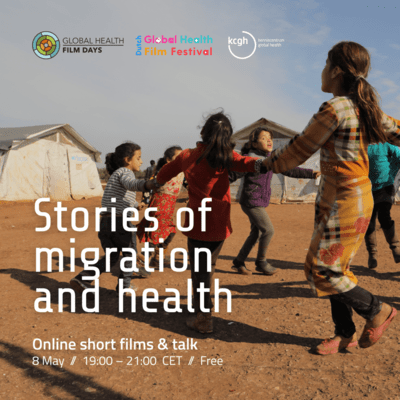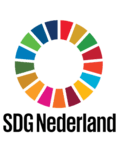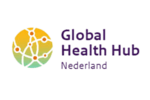Migration, health and belonging: What we learned from film and conversation
 On 8 May 2025, more than 75 participants joined us online for Stories of Migration & Health, an evening of short films and expert reflection organised by the Dutch Global Health Film Festival and Global Health Film Days in Copenhagen.
On 8 May 2025, more than 75 participants joined us online for Stories of Migration & Health, an evening of short films and expert reflection organised by the Dutch Global Health Film Festival and Global Health Film Days in Copenhagen.
The programme featured three short films exploring different stages of the migration journey. As the Crow Flies offered a personal reflection on growing up between cultures in Denmark, exploring identity, belonging and the long-term emotional impact of migration. The Swedish Speaking Migrants of Paris told the story of young men who, after building lives in Sweden, were forced to start over again in France after losing their residency status. Finally, Game Over provided a raw look at the lives of young Afghan refugees in Istanbul, living in hiding and risking everything to cross into Europe.
The panel discussion that followed, wonderfully moderated by Megan Milota (UMC Utrecht), connected these stories to real-world experiences in healthcare, community support and migration policy. The panel featured Sara Sahba (EKANN), Hussain Jafari (Dutch Red Cross), and Maria Marti Castaner (University of Copenhagen).
The panel explored how migration affects health and well-being, not just during the journey but long after arrival. Mental health emerged as a recurring theme, described as a continuous struggle shaped by prolonged uncertainty, instability and the challenges of starting over again and again. Hussain Jafari described this as "a mental crisis, not at one point, but throughout the entire journey, and often long after it ends."
The conversation highlighted how the pressure to "prove your worth" in a new society often weighs heavily on migrants, particularly on families and mothers. Maria Marti Castaner reflected on how insecure housing, frequent relocations and unsafe environments undermine well-being, making it difficult for families to build stability or meet their children’s basic needs.
At the same time, Sara Sahba stressed that despite these barriers, parents continue to prioritise their children’s health and future. Drawing on research with families in Dutch asylum centres, she shared how parents consistently express the desire for their children to receive the best care possible, yet often lack the tools or the mental space to advocate for themselves. She also reflected on the long-term impact of growing up between cultures, and how feelings of belonging and identity continue to shape lives long after resettlement.
Throughout the discussion, the speakers pointed to the importance of community-based support, from volunteer-led workshops like the Red Cross Life Skills programme, to small actions that create safe spaces for connection and learning. They closed by encouraging participants to continue listening to lived experiences and to recognise the resilience of people who, despite repeated setbacks, continue to rebuild their lives.
The recording of the panel discussion is now available to watch online: https://www.youtube.com/watch?v=9Qs13_rXc-w
The film The Swedish Speaking Migrants of Paris can be viewed online here: https://www.youtube.com/watch?v=dXuGaiXbvXE
Thank you to everyone who joined us. Stay connected for future events through the Dutch Global Health Film Festival, Kenniscentrum Global Health and the Global Health Film Days in Copenhagen.

